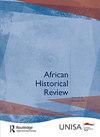Thabo Mbeki: Understanding a Philosopher of Liberation
IF 0.1
Q3 HISTORY
引用次数: 1
Abstract
ABSTRACT The political thought of Thabo Mbeki, South African President from 1999 to 2008, has attracted much scholarly and popular attention in South Africa and beyond. In this article I argue that Mbeki's socialisation in apartheid South Africa, his education, training, and travel of the world radicalised him into a philosopher of liberation, a kind of philosopher that does not only love wisdom but has the wisdom and courage to love under social and political conditions that do not permit love. Even as he personally insists that he is a simple product of the teaching and example of African liberation leaders from Gamal Nasser to Nelson Mandela, this article notes that Mbeki was conditioned and shaped by his geographic and intellectual travels into a post-continental and a planetary liberation philosopher. In that way, the intersection of geographic travel, radicalisation by oppression, and epistemic journeying combined to produce a philosophical sensibility in search for liberation and rehumanisation. To critically establish Mbeki's philosophy of liberation that has a post-continental and planetary political sensibility, this article navigates a multiplicity of other scholarly, journalistic and popular understandings of Mbeki as a philosopher king, an enigma and a revolutionary prophet on the positive side. On the negative side, Mbeki has been understood and described as a scheming and calculating Machiavellian, an imperial president, race essentialist, HIV and AIDS denialist, and a sympathiser with tyrannical leaders of Africa such as Robert Mugabe. I argue that these prevalent understandings and descriptions of Mbeki not only simplify his complicated political thought but they also uncritically conceal the reality of a philosophy of liberation that is born of the conditions of domination, dehumanisation and exploitation of the peoples of South Africa, Africa and the entire Global South.塔博·姆贝基:理解一位解放哲学家
南非总统姆贝基1999年至2008年的政治思想在南非国内外引起了广泛的关注。在这篇文章中,我认为姆贝基在种族隔离的南非的社会化、他的教育、培训和世界旅行使他成为一位解放哲学家,一位不仅热爱智慧,而且在不允许爱的社会和政治条件下有爱的智慧和勇气的哲学家。尽管他个人坚称自己是从贾迈勒·纳赛尔到纳尔逊·曼德拉等非洲解放领袖的教导和榜样的简单产物,但本文指出,姆贝基是受其地理和智力旅行的制约和塑造而成为后大陆和行星解放哲学家的。这样,地理旅行、压迫激进化和认识旅行的交叉结合,产生了一种寻求解放和重新人性化的哲学情感。为了批判性地确立姆贝基的解放哲学,这种哲学具有后大陆和全球的政治敏感性,本文从积极的方面探讨了学术界、新闻界和大众对姆贝基作为哲学家之王、谜和革命先知的多种其他理解。从消极的方面来看,姆贝基被理解和描述为一个诡计多端的马基雅维利主义者、帝国总统、种族本质主义者、艾滋病毒和艾滋病否认者,以及对罗伯特·穆加贝等暴虐的非洲领导人的同情者。我认为,对姆贝基的这些普遍理解和描述不仅简化了他复杂的政治思想,而且还不加批判地掩盖了解放哲学的现实,这种哲学诞生于南非、非洲和整个全球南方人民的统治、非人化和剥削条件下。
本文章由计算机程序翻译,如有差异,请以英文原文为准。
求助全文
约1分钟内获得全文
求助全文

 求助内容:
求助内容: 应助结果提醒方式:
应助结果提醒方式:


